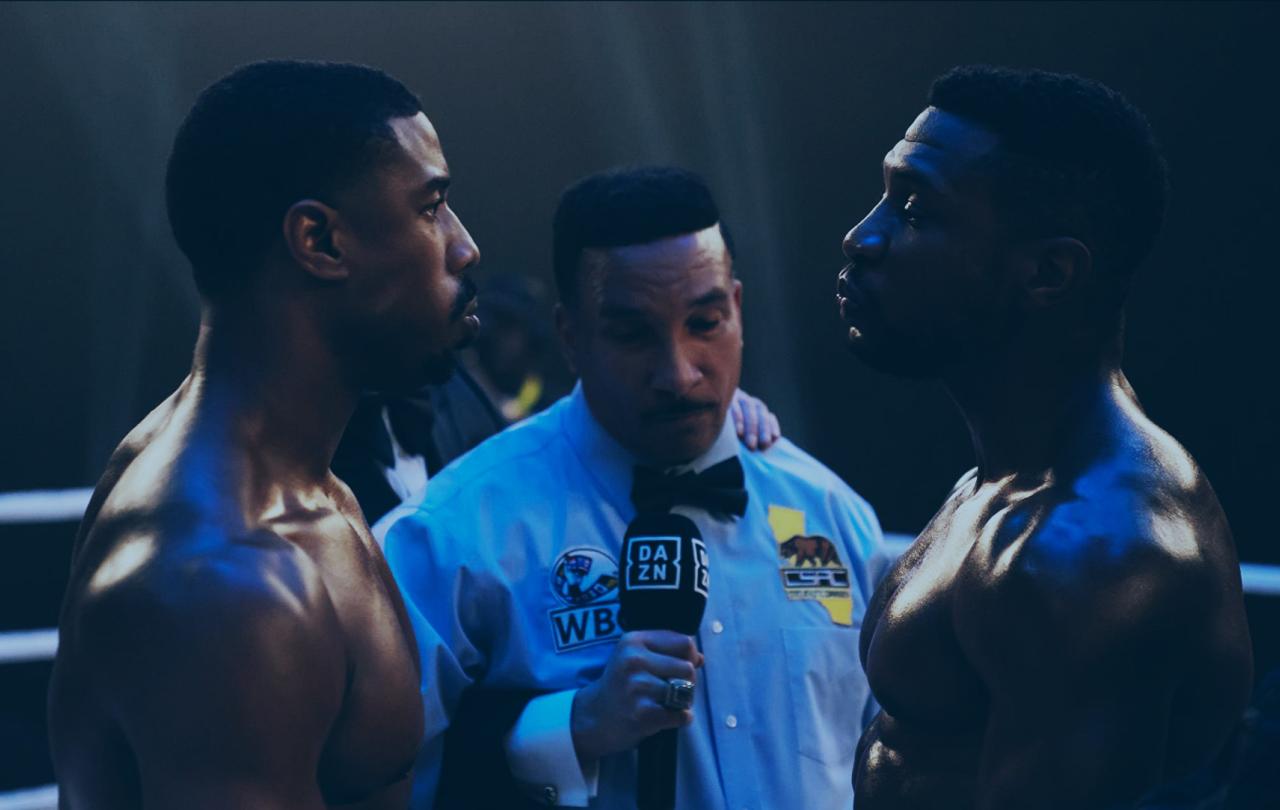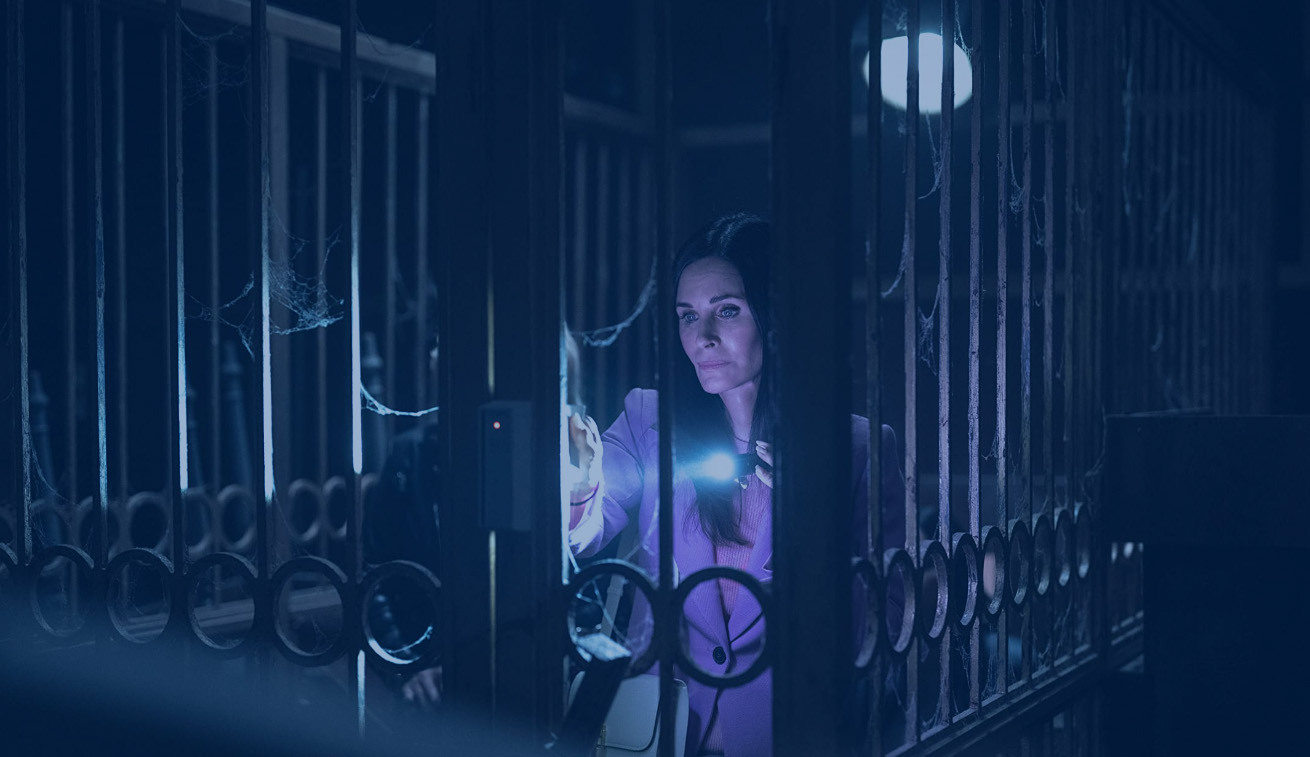
In March I watched a lot, A LOT, of violence. For me this has been a month of cinematic punching, stabbing, shooting, grappling…and its all been a bit exhausting. Oh well, let's get cracking with Creed III. The ninth instalment in the Rocky franchise has the temerity to exclude Rocky himself! I’m tempted to end the review there. No Stallone, I’m going home! It is a shame, and his presence is missed, especially when the Creed films have always felt a little like repeats of the Rocky Balboa saga. Creed III is somewhat of a mish-mash of Rocky’s III and V, and there’s nothing thematically new in this film.
So, it’s a little unoriginal and quite disrespectful to its origins…and yet I did enjoy it. Michal B Jordan makes his directorial debut, and he delivers a perfectly serviceable boxing film. Jordan’s Adonis Creed is living a perfect life: he ends his boxing career on top, has a beautiful wife and child, is running his own gym, and has found success as a boxing promoter. His idyllic life is interrupted when a figure from his youth returns, and Adonis realises that the one fight he can’t win is with his past. There are secrets, there are betrayals, there are home truths delivered and personal growth achieved; and of course there is a training montage and a climactic fight.
The plot is decent (if derivative), though rushed towards the end, and the script is solid. The performances are all fine and familiar - Jordan simply is Adonis Creed - with Jonathan Majors and Tessa Thompson being standouts. Thompson plays Adonis’ wife with a long-suffering air that subtly draws you in to an emotional dynamic that is fracturing. Majors is superb as Dame, the long-incarcerated childhood friend of Adonis’. He has the brutal physical presence needed, with his sudden, cautious, and jerky movements always reminding us that he has just come out of prison. His face is permanently set in a posture of desperation: desperate because in his eyes we see a terrifying combination of broiling rage and a deep, sad longing for love and support. Every second he is on the screen is a masterclass in building tension.
Jordan’s direction isn’t perfect, and he does indulge himself a little too much. He has spoken in interviews of his love for anime and how that has influenced his visual style (with some shots being homages to famous anime scenes). One moment in particular – where the crowd disappears during the climactic fight, and it is only Dame and Adonis in the ring sparring and raging – is just distracting and took me out of the drama of the moment. I can see what Jordan is trying to do, the innovation he thinks he is reaching for, but it fell a bit flat for me. Overall, its fine… quite fun even, and elevated more than it deserves by Jonathan Majors (he’s been doing that quite a lot for mediocre films lately). Buuuuuut…I stand with Rocky. You can’t do a Rocky film without Stallone, and no matter what anyone says this is indeed a Rocky film.
3 stars.
Scream VI

Scream VI was next. I know the question you’re asking: ‘Why do we need a Scream VI?’ Indeed. We don’t. We didn’t need a Scream 2! The original Scream was perfect and singular. It was a glorious satire of slasher tropes, done to perfection by a master of the genre. It was witty, gritty, violent, and hilarious. IT…WAS…PERFECT! To say that the steam has run-out by Scream VI is an understatement. It’s a limp and lifeless excuse of a film, trying to ape a satirical edge; except now it has decided to turn its satirical edge on itself. Now it is the tropes of franchises, and especially the Scream franchise, being dissected, except the scalpel of wit being wielded is so dull and uninspired the film is killed by blunt-force-trauma.
Perhaps to try and overcome this, the kills have now become unreasonably brutal (far too much so for a 15 rating). The camera seems to linger on the wounds and the pain inflicted with an adolescent glee that is deeply unpleasant. There are a few enjoyable and tense set-pieces (one involving a ladder precariously perched between two high-rise windows), but their impact is undercut by the film’s general awfulness. The cast is hamming it up to a ludicrous degree, seemingly without any sensible direction. The returns of veterans Courtney Cox and Hayden Panettiere are welcome until they try to deliver their lines…and who on earth thought they could make a Scream sequel without Neve Campbell!? You can’t do Rocky without Rocky, you can’t do Scream without Sidney!
1 star.
John Wick 4

Finally, I settled down to what I knew would be a comforting friend of a film: John Wick 4. The man in black, all long hair and long stares, gun-fu and jiu-jitsu, is back…and he bored me, a little. I’m so sorry to say it, and I will force myself back to the cinema to see it again to make sure I wasn’t just in a bad mood, but I really did get bored. When John Wick hit the screens in 2014 it was like a sucker-punch. It was a bonkers B-movie coming out of nowhere, that built up a bit of pace and then went hell-for-leather, and it was glorious to behold. Director Chad Stahelski’s Hollywood career had been as a stuntman and stunt coordinator, and he brought all that knowledge to create a gorgeous, gory ballet of hand-to-hand combat and frenetic gunplay saturated in neon and drowned in darkness.
It was, like Scream, a perfect one-shot. It gave us an iconic laconic Keanu Reeves performance, magnificent action, and a beautifully compact story that alluded to a larger world of assassin culture but left it for the audience to build this world in their imagination. Three sequels later and I find it all a bit of a drag. Everything is pumped-up, everything is bigger, everything is louder, and more and more people get shot… yet it’s all a bit repetitive. Every set-piece is the most fantastically choreographed dance, but they drag on too long. The assassin world has been built with a ludicrous operatic grandeur, but that takes some of the imaginative fun out of it for the audience. I’m not sure anyone really needed more John Wick in their life.
On the plus side: it looks gorgeous, it is shot masterfully, Reeves is spectacular and looks like he’s having the time of his life, and his interaction with Donnie Yen (himself on superb form) is joyous. On the downside: it is too long, it is too repetitive, and I’m not really sure what Mr Wick is doing any of this for anymore. The beauty of John Wick was the simple motivation: revenge for a murdered dog. By John Wick 4 that narrative simplicity – the real strength of the franchise – has disappeared. I did have a good time to a degree; every twenty minutes or so I’d get sucked into a set piece and marvel and what Stahelski and Reeves are able to accomplish, but then it would very quickly fade and I’d be bored again. It gains points for excellent (if far too brief) usage of Clancy Brown and Hiroyuki Sanada… Hiroyuki Sanada is enough to see any film. It loses points for Bill Skarsgård’s performance (a rare miss from him) and the Scott Adkins fat-suit…when you see it, you’ll know. The film is like junk-food: an initial rush followed by a bit of queasiness. But Reeves, Yen, and Sanada raise the standard…oh, and Ian McShane!
3 stars.
A mildly disappointing month, and at first I wondered if it was the sheer amount of violence I’d watched. Sporting violence, murderous violence, balletic violence…was it all a bit too much? The more I’ve reflected the more I think this can’t be the case – I blame my disappointment, now, on franchise fatigue. It can’t be the violence, as violence is a vital part of the Christian story. As I write this review the Church is about to enter Passiontide: the last two weeks before Easter, where we meditate on the final days of Christ’s life. Violence - the violence of Jesus’ arrest, scourging, and crucifixion - is an essential part of the story. The horror and pain of Jesus’ Passion must be meditated on, because only then can we see the wonderful and transformative power of God, who raises Christ from the dead.
Violence is an inherent part of the Christian story: Cain and Abel, the wars of the Israelite Kingdom, the oppression of the Jews under the Roman Empire, the Passion of Christ, and the fact that from the beginning of the Church to the present day there are Christians made into martyrs (those who dies rather than deny the faith). Violence and death are not some things that can be avoided, and we shouldn’t try. We ought to face up to the difficult truth that we live in a world that is often violent and painful. When we do, we begin to see those serendipities that reveal the ultimate truth - a life of pain and struggle is not our ultimate destiny.
Violence and pain, and ultimately death, are those things which God’s goodness and love will overcome. Every wrong is an opportunity for forgiveness. Every tragedy is an opportunity to show love and charity to one’s neighbour. This is not to diminish violence and tragedy, but to recontextualise it, to transfigure it. This is what Christ does on the Cross - he takes death and transfigures it into eternal life. This is what was so depressing and dissatisfying about the violence in Scream VI: it was meaningless, and for its own sake. In Creed III the violence is for sport and for the resolution of tension, and in John Wick IV the violence is a performative dance more than an actual assault, but in Scream VI its just there to leer at. Christianity accepts violence as a fact of the world, but never a fact in itself and for itself. Violence and pain are not to be ‘accepted’ - like all aspects of creation, good and bad, they point to the deeper truth that God is always working to save the world that He created in love and to bring it to Himself. This is what we can see in the aftermath of violence. This is what we can see in the aftermath of the Cross




